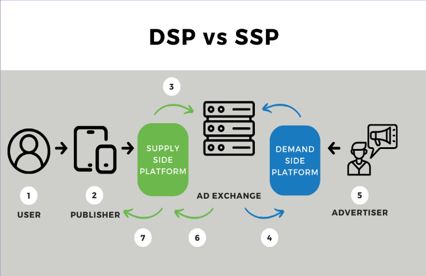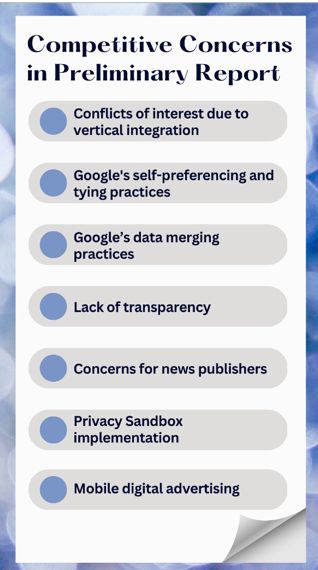Competition authorities around the world have intensified their investigations on digital markets. In that vein, digital advertising is one of the sub-sectors under competition law's scrutiny. Like its counterparts, Turkish Competition Authority ("TCA") initiated a sector inquiry regarding the competition concerns in digital advertising to outline the sector's operations, identify the concentration in the relevant markets, and investigate structural or behavioral issues. Gathering detailed information from all stakeholders, TCA published the Preliminary Report on the Digital Advertisement Sector Inquiry ("Preliminary Report" or "Report") on April 7, 20231. The Preliminary Report presents the sector's rapid growth, analyses the substitution between the different types of digital advertising, explains the ad tech operations and ecosystems in this sector, and finally puts forth the competition concerns.
Main Findings of the Preliminary Report
The Preliminary Report first reveals the market shift from traditional to online channels while outlining the advertising market's fundamental structure and functioning. According to the consumer survey prepared within the scope of the Preliminary Report to determine consumer preferences and trends, the most preferred digital platforms in Türkiye are Instagram, YouTube, Facebook, and Twitter respectively. In addition, the Report notes the average time spent on social media in Türkiye 3 hours a day, which exceeds the European average.

The Preliminary Report spares a significant space for the services that bring advertisers and publishers together in the virtual environment, known as advertising technologies or ad tech. These services are defined as the primary sources of the complex structure of the digital advertising markets and the lack of transparency in the sector and are listed as ad servers, demand-side platforms (DSP), and supply-side platforms (SSP) that convey the requests of advertisers and publishers to exchanges, data management platforms, and ad exchanges. The Preliminary Report finds that 70% of the digital advertising market operates through programmatic channels based on these ad technologies, and auctions happen within milliseconds.
Moreover, the Preliminary Report identifies data as a critical input for competition in this market; The market is said to shift towards targeted advertising, which is generally based on user data. In this regard, Meta and Google are found to have a significant data advantage. Additionally, it is noted that Meta and Google have tools that allow them to collect data from third parties, which enables them to make better predictions about consumer preferences.
In terms of data collection, the Preliminary Report emphasizes privacy concerns. The Report highlights that many consumers surveyed are unaware that they are sharing their personal data. The consumers participating in the survey also underscore the importance of privacy. Still, only 50% of them read the privacy terms (privacy paradox), and only 50% of those who read them understand these conditions.
Market Definition and Concentration
The Preliminary Report allocates one section for the different types of digital advertising and the substitution between them. The findings in this section will be substantial for the market definition in the upcoming cases of TCA in digital markets. The Preliminary Report identifies that digital advertising constitutes a different relevant market than conventional advertising. Additionally, it states that search, display, and classified ads markets are various submarkets in digital advertising. Regarding the subcategories of display advertising, it does not suggest a precise market definition. However, the Preliminary Report differentiates video advertising and social media advertising in the display category, referring to the information collected from the parties. Although it does not make a precise market definition, TCA signals that it may adopt narrower market definitions in some cases.
Another finding related to this section is the high concentration of search and display markets, the former by Google and the latter by Meta. The preliminary Report states that even popular social media platforms such as LinkedIn, Twitter, Snapchat, and TikTok have limited market share, and the other publishers have lost market share. Similarly, the Preliminary Report states that the ad tech market is also concentrated. Google offers services at every stage of the ad tech market and has significant market shares in each service. In fact, its market share in the SSP market exceeds 90%. Additionally, it is mentioned that the vertically integrated structure of Google plays an essential role while customers prefer its services.
Additionally, the Preliminary Report recommends an ecosystem approach against the failure of the traditional competition law, which focuses on the substitutability of services. The Preliminary Report mentions the benefits of ecosystems for the platforms as well as underlying economic reasons behind it. However, it is observed that ecosystems can create grounds for concerns about the potential lack of competition, facilitating the transfer of market power from one market to another through leverage and competition issues arising from the processing and merging of data.
Competition Concerns
The Preliminary Report highlights seven fundamental concerns for this market. These concerns overlap with those identified in other reports of competition authorities worldwide, and some of the concerns are basically based on these reports.

The Preliminary Report first suggests that vertically integrated ad intermediaries lead to conflicts of interest when serving different customer groups simultaneously. Another concern raised in the Preliminary Report is the lack of transparency in the market. It underscores the significance of informed choices and the accurate evaluation of factors such as price, quality, and performance of ad tech. Still, there is a lack of transparency on these elements in the supply chain.
The Preliminary Report finds that the big data the platforms have and specific practices of platforms may eliminate the need to access news content producers' websites and cause platforms to benefit from the investment of news publishers. Providing examples from other country analyses, the Report says that no determination can be made regarding the validity of these concerns in Türkiye.
Concerns about Google
Significant part of the concerns raised about the sector in the Preliminary Report is specifically related to Google. Therefore, the Preliminary Report differs from other reports, which generally express their concerns for this market on the practices and power of Google and Meta. However, the Preliminary Report has reserved a special place for concerns originating just from Google. In this vein, we can claim that the main concern of TCA is about the functioning of the advertising technologies market, where Google is vertically integrated and has a significant market share.
The Preliminary Report emphasizes the concern that Google may abuse its market power in the ad tech market by providing advantages to its other services or by leveraging its dominance in the general search engine market to favor its own services in the ad tech market. The Report states that information gathered during the sector inquiry indicates the tying practice of requiring the use of Google's DSP to access YouTube ad inventory. Such practice would be concerning from a competition perspective if advertisers prefer to work with only one DSP. Additionally, by referencing the decisions and studies in other countries, the Preliminary Report expresses concern over Google's advantage in ad auctions' dynamic allocation and header bidding processes. It states that this may potentially allow Google to promote its own ad technologies.
The Preliminary Report provides examples from various country studies and states that concerns about data combination, which came to the agenda with the Facebook investigation decision in Türkiye, are also applicable to Google. Last, the Preliminary Report touches upon the Privacy Sandbox, which has been criticized worldwide due to some competition concerns. It states that it is essential to develop the Privacy Sandbox practice in a way that does not harm competition and recommends further monitoring. Similarly, it discusses tracking users across apps on mobile devices and heralds a new sector inquiry. The Report states that the policy changes in this matter and potential anti-competitive concerns will be analyzed in more detail as part of the sector inquiry into mobile ecosystems.
What comes next
The Preliminary Report provides a concentrated market structure for every sub-market of the online advertising sector. In addition, the industry's lack of transparency, concerns about consumer data protection due to the privacy paradox, and the advantage of big players in data ownership come to the fore. In addition, in the case of Google, serious concerns such as data aggregation, tying, and self-preferencing are highlighted. All these findings indicate that this market, and therefore the significant players of the market, will be closely followed by the TCA soon.
Footnote
1. The Report may be accessed here.
The content of this article is intended to provide a general guide to the subject matter. Specialist advice should be sought about your specific circumstances.


